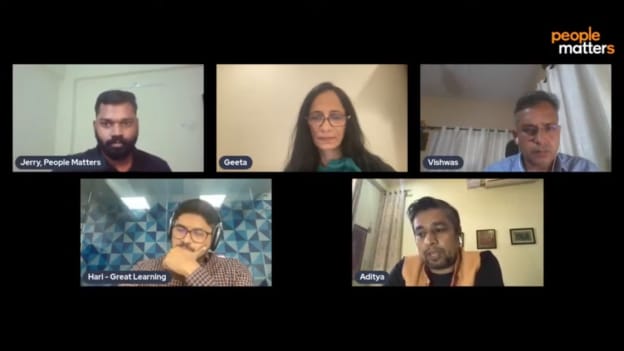Enabling Organisations to Meet their Hiring Needs in the Digital Workspace

Earlier this year, NASSCOM had reported that the demand for cloud technology professionals is likely to hit 2 million in 2025. With this statistic in mind and a vast pool of talent looking to build their careers, a facet requiring attention is entry-level hiring. Even prior to the talent acquisition process, companies lay out their hiring needs and it is critical that we find the most efficient strategies to achieve this for greater business outcomes. Simultaneously, opportunities need to be made available for fresh talent to acquire the digital skills in demand.
In this session hosted by People Matters and Great Learning where we focus on meeting entry-level hiring needs in a digital world, we were joined in by key leaders Geeta Gwalani, Global Head of HR - BFSI Platforms, Tata Consultancy Services; Vishwas Deep, Vice President – Global Talent Acquisition Head,Wipro Limited; Aditya Pal Singh, Director Head Talent Acquisition, Informatica and Hari Krishnan Nair, Co-Founder, Great Learning. Some of the critical insights this session delved into included hiring trends, the digital skills landscape, the employment landscape for freshers, hiring on a large scale as well as democratisation of hiring.
Key Hiring Trends across the digital sphere:
It is evident that there has been a heightened use of technology with increasing focus on virtual and remote working. The hiring market has also become an increasingly candidate led market where there is deep emphasis on candidate needs, building a purpose driven organisation with critical D&I measures. Along with the changing rules of work in a candidate driven market, all leaders attested to the significant increase in hiring volumes, notably of freshers. In a digital world, organisations that can showcase to potential recruits that they will be working on cutting edge technologies are likely to hire more.
Aditya while agreeing to the above changes also pointed out that there is a workforce shift along with the rapid pace of digital transformation. There has been a decisive shift towards a ‘we’ economy which demands organisations to inculcate the value of transparency, culture building and trust while at the same time creating a global, borderless talent hunt.
Challenges encountered in the hunt for digitally skilled talent:
When the discussion geared towards digital skills, a number of them were listed from data analysis, full stack, low code development, knowledge of cybersecurity to basic analytic program skills when it comes to engineers and those in the IT industry. But when it comes to skills that are critical to the long term employee lifecycle, it’s the soft skills that matter: complex problem solving, critical thinking, cognitive flexibility, emotional intelligence, communication and learnability. Vishwas affirms that candidates who are self-motivated learners on the lookout towards upskilling themselves are what organisations ultimately want to recruit.
However, the challenge that remains is recruiters and hiring managers are all looking at the same talent pool. In order to attract the best talent to organisations, sufficient investments have to be made to make them company ready.
This is even more critical when it comes to freshers who will have to transition from the campus to the office atmosphere. Retaining fresh talent is a hurdle that companies must continuously overcome given the high rates of attrition. Lack of soft skills is also a demerit in the hiring landscape these days.
Critical strategies for more efficient hiring:
Care is the new currency as highlighted by Geeta when it comes to building strategies for large scale hiring and retention. Organisations must not simply offer a job but a long-term career which offers opportunities for strong-work collaboration; there has to be greater focus on health and wellness with a family centric approach along with building engagement with your employees and offering opportunities for continuous learning.
One of the guiding principles in this endeavour is also mentioned by Vishwas, “Think from a fresher’s perspective.”
Technology plays a key role in devising new strategies as well. From democratizing access to learning and development, equal opportunities for getting hired are also made possible. Platforms such as Great Learning help empower students by transforming them into pre-assessed and qualified candidates. Hackathons and codeathons also play their part in the practice of unbiased hiring practices. Tech enabled assessments when used on a continuous basis can help ensure that the right people are hired.
Final Takeaway:
The key takeaways to sum up this discussion would be: one has to first go where the talent is and use technology for greater outreach and democratization of hiring opportunities. This can then be followed by mass personalisation of technology solutions to cater to the unique individual’s onboarding and overall employee life-cycle. And ultimately, it all comes down to care. Making your new recruits feel like they belong and offering them continuous opportunities for their development and growth is what will ultimately make them stay. Although this entire process requires investment on the part of organisations and HR leaders, it is one that will add value to the organisation for it will bring in the best of talent who will drive organisational growth.
You can watch the full webcast below.









